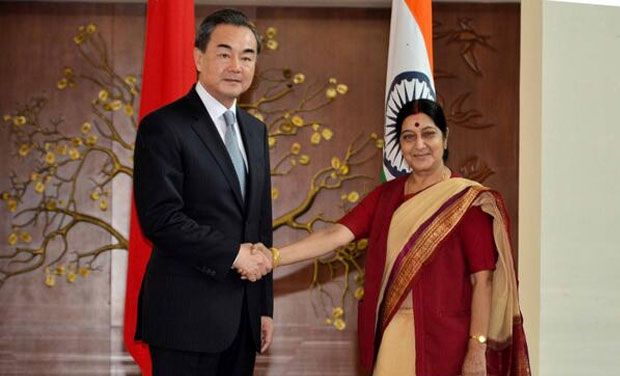
New Delhi: China’s foreign minister began a two-day visit to India on Sunday for the first high-level talks between the world’s two most populous nations since Prime Minister Narendra Modi took charge.
Wang Yi arrived in New Delhi as a special envoy of Chinese President Xi Jinping to “establish contact with the new government of India”, the Indian foreign ministry said.
Meanwhile, exiled Tibetans held protest in Delhi against Wang’s visit and set ablaze a Chinese flag.
Despite his hardline nationalist reputation, Modi has been making overtures to traditional rivals China and Pakistan since his Bharatiya Janata Party swept to power last month.
The new Indian leader has invited Xi to visit later this year.
Wang is coming “to engage with our leadership and we will take it from there”, foreign ministry spokesman Syed Akbaruddin told a news briefing last week.
“We would be in a listening mode to engage and see.”
The Chinese foreign minister is set to meet Indian government officials, including his new Indian counterpart Sushma Swaraj and President Pranab Mukherjee. He is slated to see Modi on Monday.
Foreign policy expert Ranjit Gupta told that the visit was a “good augury”.
“China has gone all out to woo the new Indian government, which is a great gesture,” Gupta, a member of the Indian Security Advisory Council of the US-India Institute, a Washington-based think-tank, said.
“India and China are emerging global powers and with better relations, India will hopefully resume its growth path and reclaim its position in Asia.”China is India’s biggest trading partner, with two-way commerce totalling close to $70 billion. But India’s trade deficit with China has soared to over $40 billion from just $1 billion in 2001-02, Indian figures show.
Experts say Modi must bridge the deficit by seeking greater access to the Chinese market, with the two sides targeting annual bilateral trade of $100 billion by 2015.
“The deficit is a huge embarrassment that keeps growing,” said Gupta.
But, despite the strong trade ties, relations are still dogged by mutual suspicion — a legacy of a brief, bloody border war in 1962 over the Indian state of Arunachal Pradesh, nestled in the eastern stretch of the Himalayas that China claims as its own.
Modi warned China to shed its “expansionist mindset” at an election rally earlier this year. China hit back, saying it “never waged a war of aggression to occupy any inch of land of other countries”.
The nuclear-armed nations, both with one-billion-plus populations, are expected to focus on economic ties and border issues during Wang’s visit, following a territorial flare-up in April 2013.
India accused Chinese troops of intruding nearly 20 kilometres (12 miles) into Indian-claimed territory, triggering a three-week standoff that was resolved when forces from both sides pulled back.
The border between China and India has never been formally demarcated, although they have signed accords to maintain peace.
Meanwhile Tibet’s government-in-exile, based in India, has pinned its hopes on Modi’s government to speak up for Tibetans during Wang’s visit.
“This is in the Interest of India as well because Tibet, as a buffer zone between India and China, has served the interests of all neighbouring countries,” exiled Tibetan premier Lobsang Sangay told AFP.
The government-in-exile launched a renewed push this week for greater autonomy from Beijing, which has ruled the Himalayan territory since 1951.
But China last week dismissed any possibility of discussions on Tibet, calling Sangay an “out-and-out separatist”.
India hosts the world’s largest Tibetan exile population after offering refuge to the Dalai Lama. The spiritual leader fled across the Himalayas to India after a failed 1959 uprising against Chinese rule.


